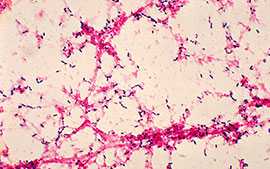Streptococcus pneumoniae

Streptococcus pneumoniae (S. pneumoniae) are lancet-shaped, gram-positive, facultative anaerobic bacteria with over 90 known serotypes. Most S. pneumoniae serotypes can cause disease, but only a minority of serotypes produce the majority of pneumococcal infections.
Pneumococci are common inhabitants of the respiratory tract and may be isolated from the nasopharynx of 5–90% of healthy persons, depending on the population and setting. Only 5–10% of adults without children are carriers. Among school-aged children, 20–60% may be carriers. On military installations, as many as 50–60% of service personnel may be carriers. The duration of carriage varies and is generally longer in children than adults. In addition, researchers do not clearly understand the relationship of carriage to the development of natural immunity.
Related Page
-
Pink Book’s Chapter on Pneumococcal Disease
Epidemiology and Prevention of Vaccine-Preventable Diseases textbook
- Page last reviewed: September 6, 2017
- Page last updated: September 6, 2017
- Content source:


 ShareCompartir
ShareCompartir